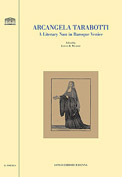

| L002099
 Arcangela Tarabotti. A Literary Nun in Baroque Venice Serie «Seminario Susan and Donald Mazzoni», 2006 a cura di Elissa Weaver Il Portico n. 134 pp. 242, 9 ill. bn, ISBN 88-8063-492-5 € 22.00 tramite Casalini Libri Digital Division Elissa Weaver, Introduction - Anne J. Schutte, The Permeable Cloister? - Gabriella Zarri, Venetian Convents and Civic Ritual - Mario Infelise, Books and Politics in Arcangela Tarabotti’s Venice - Daria Perocco, Prose Production in Venice at the Beginning of the Seicento - Beatrice Collina, Women in the Gutenberg Galaxy - Letizia Panizza, Reader Over Arcangela’s Shoulder: Tarabotti at Work With Her Sources - Stephanie Jed, Arcangela Tarabotti and Gabriel Naudé: Libraries, Taxonomies, and Ragion di Stato - Wendy Heller, La Forza d’Amore and the Monaca Sforzata: Opera, Tarabotti and the Pleasures of Debate - Lynn Lara Westwater, The Trenchant Pen: Humor in the Lettere of Arcangela Tarabotti - Meredith Kennedy, Making the Private Public: Arcangela Tarabotti’s Lettere familiari - Nathalie Hester, Taking After Tarabotti? A Seventeenth-Century Sienese Discorso - Franco Fido, From Cloister to Saintliness or Glory: The Cases of Mère Angélique of Port-Royal and Suor Juana Inés de la Cruz. |
This volume of essays is the first of its kind devoted to the life and work of the Venetian writer Arcangela Tarabotti (1604-1652), a Benedictine nun and early feminist, who published polemical treatises in defense of women and a letter collection. Recent scholarly interest in her has produced modern editions and translations of her works and more are soon to appear. Tarabotti is best known for her protest against forced religious vocations, a widespread practice in early modern Italy, of which she was a victim and whose social and political underpinnings she exposed. She argued for greater freedom of choice for women and for their education, and she carried on a spirited correspondence with powerful members of the cultural establishment who sought unsuccessfully to restrain her polemical vein. The twelve essays in this volume, edited by Elissa Weaver, present fresh investigations of Tarabotti’s work and of the cultural, religious, and political contexts in which she lived.